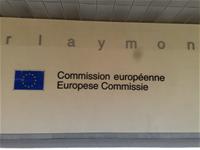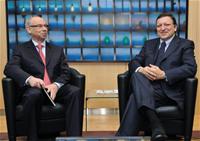Is it time for common European taxes?
Ralitsa Kovacheva, August 16, 2010
 Why, while pressing Member States to cut spending, Brussels is trying to collect more money through the introduction of a common European tax? And isn't it cynical, against the background of the attempts of some governments (including the Bulgarian one) not to increase the tax burden to fill their budget deficits? Why should Brussels collect taxes which could otherwise fill national treasuries? And why governments, quite reasonably though, are expected to manage their budgets better and spend their money in a more rational way, but the same doesn't apply to the EU?
Why, while pressing Member States to cut spending, Brussels is trying to collect more money through the introduction of a common European tax? And isn't it cynical, against the background of the attempts of some governments (including the Bulgarian one) not to increase the tax burden to fill their budget deficits? Why should Brussels collect taxes which could otherwise fill national treasuries? And why governments, quite reasonably though, are expected to manage their budgets better and spend their money in a more rational way, but the same doesn't apply to the EU?
These are only a few of the questions, raised by the idea of the European Commission to  tax (for the first time in EU's history) European citizens with direct euro taxes. In the cautious Brussels manner, in mid-August holiday time, the European Commissioner for Budget Janusz Lewandowski has unleashed the spirits, saying that the Commission is considering the introduction of a common European tax on financial transactions, carbon trading or aviation fuel. The purpose is the collected money to go directly to EU's budget in terms of its own resources.
tax (for the first time in EU's history) European citizens with direct euro taxes. In the cautious Brussels manner, in mid-August holiday time, the European Commissioner for Budget Janusz Lewandowski has unleashed the spirits, saying that the Commission is considering the introduction of a common European tax on financial transactions, carbon trading or aviation fuel. The purpose is the collected money to go directly to EU's budget in terms of its own resources.
The idea of a financial transaction tax is circulating since last year, launched firstly by Commission President José Manuel Barroso, then by the President of the European Council Herman van Rompuy. Barroso was ambitious to impose the idea at a G20 level, but admitted defeat. However, the idea has a broad support in the European Parliament. A curious fact is that, so far, it has been launched more as a reward for the efforts of taxpayers to rescue the banking system, rather than, in plain text, as a new source for EU's budget. Regarding the carbon tax, so far the idea has been such a tax to be introduced across Europe, but to be collected by national governments in the form of an additional tax on energy.
Currently the budget of the EU (140 billion euros for 2010, which is approximately 1 percent of EU's GDP) is being formed by the so-called own resources (customs duties and VAT), which represent less than one quarter of the budget, and contributions from Member States, set on the basis of 0.73% of GNI (Gross National Income) of each country (76% of the budget). For comparison, in 1988, 89 per cent of the budget was formed by own sources, the Financial Times notes. The big trump card of the Commission, to push the proposal, is that this will decrease Member States' contributions.
This seemingly tempting proposal, however, has encountered sharp resistance from the United Kingdom, Germany and France - the countries with the largest contributions to the EU budget: Germany 19.6% of the budget, France 18%, UK 10.4% . The argument of the three states against the idea is the same as usual: tax policy is a national governments business. Which raises the curtain and reveals the bifurcation of post crisis Europe: More Union? How much more? Where more?
The problem with granting more powers to Brussels for economic and financial policies is also seen through the case of a common tax. The question (at least for now) is not so much economical but political. And this will be a test for the political will of national governments, which does not necessarily mean a support for the idea. We know few details still to judge appropriately. It is clear, however, that timing is crucial.
After the peer review of Member States' budgets (which seemed impossible until recently), the idea of a common European tax seems no longer so extreme; moreover, against the background of the attempts to reboot the single market, which inevitably goes through (at least) convergence of tax systems - currently being a definite prerogative of national governments. A common euro tax is perhaps the first step on this path.
The decision, however, cannot be taken aside from the debate about the policies that need to become (or remain) a priority for the Union during the next programming period (2014-2020) and how (how much) these to be funded. For this purpose, in the European Parliament a Special Committee on Policy Challenges and Budgetary Resources for a Sustainable post-2013 European Union has been created (its Vice-President is the Bulgarian MEP from the Group of Socialist and Democrats Ivaylo Kalfin.)
One of its most important issues is the reform of EU' agriculture policy, which many say is more expensive than effective and the way it is functioning needs to be radically changed; including also a reduction of its budget - a thesis, which now meets resistance by the dominant party in the European Parliament - the European People's Party (EPP) - but undoubtedly this issue will be discussed yet.
The idea EU budget to be financed directly by taxpayers, however, may bring another indirect benefit: if EU citizens would know that some of their money goes directly to EU's budget, maybe it will change their attitude towards Brussels, perceived now as an alien body. Maybe it will make them more demanding both to the European and national institutions in terms of how they spend taxpayers' money.
Yet in 2007 the EP adopted a resolution "The future of the EU's own resources" in which expressed its deep concerns that "the current system of own resources based on Member States' contributions is both unfair to the general public and anti-democratic, and does not help to highlight the commitment to European integration; furthermore, such a system, since it makes the contribution to the European Union be perceived as an additional burden on national budgets, does not provide the Union with sufficient funds for all its policies”. As it is "excessively complex, lacks transparency and is completely incomprehensible to European citizens” the financing system of the EU budget “does nothing towards fulfilling the requirement of establishing a direct link between the Union and its citizens”.
 The point is that the path to change passes through national governments' will to cede more powers (and money) to Brussels. And through Brussels's will, establishing a more direct link with EU citizens, to manage their money for their benefit, not according to eurocratic initiatives. Whether they will do this, we will probably know in September, when the Commission will officially launch the idea of a common euro tax.
The point is that the path to change passes through national governments' will to cede more powers (and money) to Brussels. And through Brussels's will, establishing a more direct link with EU citizens, to manage their money for their benefit, not according to eurocratic initiatives. Whether they will do this, we will probably know in September, when the Commission will officially launch the idea of a common euro tax.
Meanwhile, however, Member States are already involved, in one form or another, in collecting money into a common purse – the European rescue fund which was created to save Greece from bankruptcy. This case clearly shows that the idea of a common treasury is indispensable, at least where there is common currency. The case of Greece has shown something one more thing - that the common monetary policy can not be conducted without a common economic policy. Do we need another cataclysm to make the need for a common purse clear ?